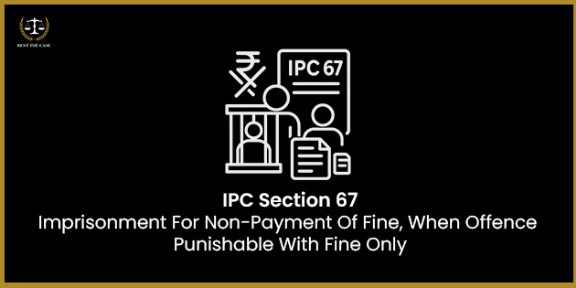IPC
IPC Section 67 - Imprisonment For Non-Payment Of Fine, When Offence Punishable With Fine Only

In criminal cases, fines are often imposed as punishment, especially in minor or non-violent offences. But what happens when the person refuses or is unable to pay the fine? The Indian Penal Code (IPC) provides a clear answer under Section 67, which allows for imprisonment in default of fine payment, even when the original offence is only punishable with a fine.
This provision may appear simple on the surface, but it carries important implications for judicial discretion, sentencing fairness, and the rights of the accused.
What We’ll Explore in This Blog
- The original text and legal meaning of IPC Section 67
- The logic behind imprisonment for fine-only offences
- Duration limits set under this section
- Practical implications and judicial application
- Constitutional concerns and fairness
- Its continuing relevance in Indian criminal law
What Is IPC Section 67?
Legal Text:
“If the offence be punishable with fine only, the imprisonment which the Court imposes in default of payment of the fine shall be simple, and the term for which the offender is to be imprisoned in default of payment of the fine shall not exceed two months when the amount of the fine does not exceed fifty rupees, and shall not exceed four months when the amount does not exceed one hundred rupees, and in no case shall exceed six months.”
Simplified Explanation
This section provides the Court with the power to impose simple imprisonment if the offender fails to pay a fine, even in cases where no imprisonment is prescribed for the offence.
It also sets maximum time limits for imprisonment in default:
- If the fine is up to Rs. 50, imprisonment cannot exceed 2 months
- If the fine is between Rs. 51 to Rs. 100, imprisonment cannot exceed 4 months
- If the fine is above Rs. 100, imprisonment cannot exceed 6 months
All imprisonment awarded under this section must be simple imprisonment, not rigorous.
Purpose of Section 67
The key objectives behind IPC Section 67 include:
- Ensuring compliance with the court’s orders
- Providing a legal mechanism to penalise wilful non-payment
- Deterring individuals from treating fines casually
- Allowing the state to enforce financial penalties in a structured and time-bound manner
Practical Implications
Courts often invoke Section 67 when:
- The offender refuses to pay the fine despite being capable of doing so
- The offender absconds after being fined
- The accused fails to pay within a reasonable period
However, the prison term is not automatic. Courts usually allow a reasonable time for payment and assess whether the non-payment is deliberate or due to genuine poverty.
Judicial Interpretation and Concerns
Indian courts have shown restraint in applying this section strictly. They often ask whether imprisonment in such cases:
- Violates Article 21 (Right to Life and Personal Liberty)
- Constitutes excessive punishment for economically weaker offenders
- Upholds the principle of proportionality
In Khatri v. State of Bihar, the Supreme Court cautioned that poor convicts should not be imprisoned simply for being unable to pay fines, and alternatives like community service or instalment-based recovery must be considered.
Why IPC Section 67 Still Matters
Even in modern times, Section 67 is important because:
- It provides enforceability to fines, especially in traffic, nuisance, and public order offences
- It adds a deterrent value even when offences are minor
- It holds wealthier offenders accountable by discouraging fine payment evasion
- It allows the judiciary to balance financial penalties with constitutional rights
Conclusion
IPC Section 67 bridges the gap between financial penalties and enforceable punishment. While it empowers courts to impose simple imprisonment for non-payment of fines, its application requires judicial sensitivity and constitutional balance. As criminal justice evolves towards reformative goals, Section 67 must be used sparingly, only when fine default is deliberate, dishonest, or disruptive to justice.
Frequently Asked Questions
Q1. Does IPC Section 67 allow imprisonment for any unpaid fine?
No, It applies only when the offence is punishable with a fine only, not when other punishments like imprisonment are prescribed.
Q2. Can the court directly send a person to jail under Section 67?
No, courts usually allow a time frame to pay the fine. Only deliberate non-payment leads to imprisonment.
Q3. Is the imprisonment under Section 67 simple or rigorous?
Only simple imprisonment is allowed under Section 67.
Q4. What if someone is too poor to pay the fine?
The court may consider financial incapacity and use discretion. Imprisonment should not be used unfairly against the poor.
Q5. What is the maximum imprisonment possible under this section?
Six months, regardless of how high the fine amount is.






